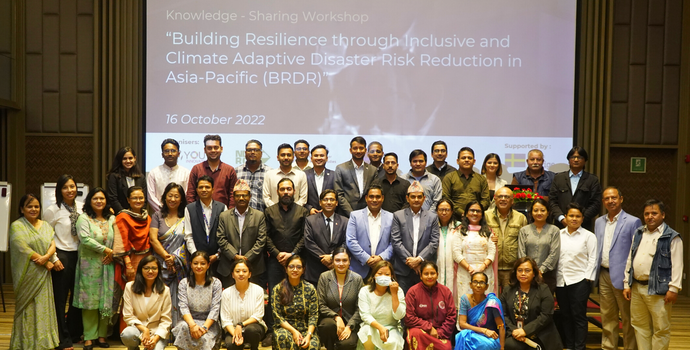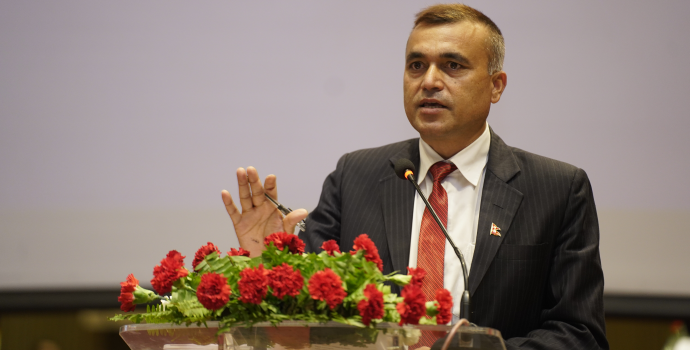- About Us
-
Who we are
-
- Publications
-
- ADPC Academy
-
MediaADPC'S NEWS
Women’s leadership, localization, and tech-driven change: important lessons and knowledge from Nepal Women’s leadership, localization, and tech-driven change: important lessons and knowledge from Nepal
16 Oct 2022
Kathmandu, Nepal

Participants posing for a group photo
Over 40 participants including government officials, municipality mayors, partner organizations, civil society and UN agencies took part in ADPC’s Knowledge Sharing Workshop to talk about promoting inclusive, gender equal and rights-based approaches in Nepal’s disaster risk reduction (DRR) efforts.
The workshop was organized together with the Government of Nepal’s Ministry of Home Affairs (MoHA), Ministry of Federal Affairs and General Administration (MoFAGA), and National Disaster Risk Reduction and Management Authority (NDRRMA).
Social inequality is a key driver of people’s exposure and vulnerability to disaster and climate change impacts. ADPC’s Building Resilience through Inclusive and Climate Adaptive Disaster Risk Reduction in Asia-Pacific (BRDR) program has been working with partners and stakeholders in Nepal and the Philippines to put gender-sensitive, inclusive, and rights-based approaches at the forefront of enhancing risk reduction since 2018.
With the BRDR program closing at the end of this year, the workshop heard and documented country partners’ lessons learned, progress and challenges in areas like data and technology-driven approaches, inclusive Local Disaster and Climate Resilience Plans (LDCRPs), advancing women’s leadership and the way forward.
Mr. Dijan Bhattarai, Under Secretary of the National Disaster Risk Reduction and Management Authority (NDRRMA) in his opening remarks, appreciated the efforts of ADPC for its support in promoting inclusive, gender-equal, and rights-based approaches for DRR and climate resilience in Nepal. He also recognized joint efforts carried out for the Building Information Platform Against Disaster (BIPAD) portal and Visualizing Risk (VisRisk) online platform.
The workshop highlighted features of the BIPAD portal - an integrated and comprehensive disaster information management system that facilitates disaster communication and post-disaster event coordination, and VisRisk - an interactive tool used to visualize data and information on hazard, exposure, and vulnerability for informed decision-making for disaster risk reduction and management.
Data collection is extremely important in DRR to help practitioners understand existing gender inequality and economic information for recovery. These two online portals support technology-driven data collection and analysis in Nepal.
Presenters included Mr. Krishna Ghimire, Program Coordinator, National Disaster Risk Reduction Centre (NDRC), Ms. Indu Panta Ghimire, Women Humanitarian and Disaster Risk Reduction Platform (WHDRRP) Advisor at the Centre for Disaster Management Studies (CDMS), and Ms. Reena Bajracharya, DRR Program Manager at Youth Innovation Lab (YI-Lab).
Experience sharing also noted efforts at the provincial and municipal levels. Among the highlights were reflections from municipal bodies: Mr. Prahlad Sapkota and Mr. Binod Regmi, Mayors of Ratnanagar and Kalika Municipalities respectfully, on inclusive and gender-equal risk reduction. Lessons learned were presented by WHDRRP on their ongoing initiative to support women DRR networks and women leaders in Madhesh, Bagmati and Sudurpashim provinces with support by CDMS.
DRR fellows of five municipalities of Chitwan district - Ratnanagar, Kalika, Rapti, Khairahani, and Madi- and their technical support to local administration showcased significant contributions and potential for continued actions on localizing the BIPAD portal.

Mr. Pradip Koirala, Head of the Disaster and Conflict Management Division, MoHA, delivering his closing remarks.
Chief Guest Mr. Pradip Koirala, Head of the Disaster and Conflict Management Division at Nepal’s Ministry of Home Affairs (MoHA), thanked all participants for their contributions in his closing remarks and highlighted key DRR initiatives undertaken by the Government of Nepal.
The BRDR program is implemented by ADPC, along with the Swedish Civil Contingencies Agency (MSB), Stockholm Environment Institute (SEI), and Raoul Wallenberg Institute with the support of the Swedish International Development Cooperation Agency (Sida).
Latest NewsRelated Trainings
-